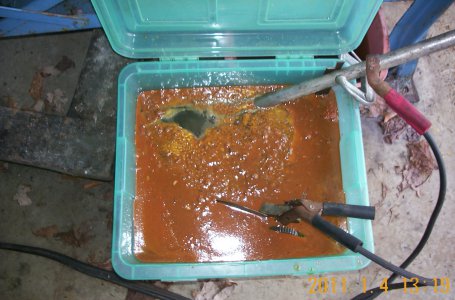- Joined
- Feb 23, 2013
- Messages
- 152
Hello TO ALL
I've been busy with spring (here in NY) and haven't had much time for renovation of
the SB (Thread" SB in waiting for 6 months"). However , I started again cleaning up the tailstock,
have it all apart. I've used oven cleaner(spray and liquid), paint striper, acetone, mineral spirits, etc.
It cleans up most of the grease and some of the paint , BUT not to the degree that I find satisfactory.
I've seen articles on using washing soda in an water bath with a battery chargers' electrodes to
remove the rust(not in my situation), but can this set up be used for removal of grease and paint?
It seems the paint is baked on and only comes off with a small chisel scrapping it away or perhaps
go the way of a wire wheel on a flexible shaft.
Thanks for any help............. Razinman
I've been busy with spring (here in NY) and haven't had much time for renovation of
the SB (Thread" SB in waiting for 6 months"). However , I started again cleaning up the tailstock,
have it all apart. I've used oven cleaner(spray and liquid), paint striper, acetone, mineral spirits, etc.
It cleans up most of the grease and some of the paint , BUT not to the degree that I find satisfactory.
I've seen articles on using washing soda in an water bath with a battery chargers' electrodes to
remove the rust(not in my situation), but can this set up be used for removal of grease and paint?
It seems the paint is baked on and only comes off with a small chisel scrapping it away or perhaps
go the way of a wire wheel on a flexible shaft.
Thanks for any help............. Razinman


